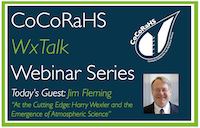|
|
Webinar # 18 - Thursday, May 9, 2013
At the Cutting Edge: Harry Wexler and the Emergence of Atmospheric Science
Jim Fleming, Colby College, Waterville, ME

(biography)
"This presentation tells the story of the emergence of the new
interdisciplinary field of atmospheric science in the twentieth century
as shaped by the influences of multiple technologies. It does so from
the perspective of MIT-trained meteorologist Harry Wexler (1911-1962),
an American student of the Bergen School of air mass analysis, head of
research in the US Weather Bureau, and one of the most influential
meteorologists of the twentieth century, whose career spanned the middle
decades of the twentieth century.
In the first four decades of the twentieth century, aviation, radio
communication and remote sensing, and the needs of two world wars
dramatically re-shaped and expanded the meteorological enterprise.
During the Cold War era, new technologies involving atomic energy,
digital computing, rocketry and satellites provided meteorologists with
powerful tools to study the atmosphere and precipitated fundamental
changes in the older traditions of aeronomy, climatology, and weather
analysis and forecasting.
Much is to be learned by examining the nexus of new techniques and
technologies in the early and middle decades of the twentieth century as
they contributed to the transformation of meteorological science,
service, and practice into a new synthetic field called “atmospheric
science.” Yet the story of the emergence of atmospheric science is so
complex, dauntingly so, that it has never been told in its entirety. By
telling the story through Wexler’s eyes, a more personal story can be
told."

View the Webinar by clicking here: http://youtu.be/O-MqY0y1rt8
Resources:
Jim's historical books: http://www.amazon.com/James-Rodger-Fleming/e/B001H6S3B4
|
|